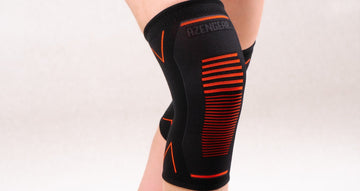Understanding and Managing Knee Pain While Running: Including the Role of Knee Braces and Compression Sleeves
by Emily Jannet on Mar 29, 2024
Running is a fantastic form of exercise, offering numerous physical and mental health benefits. However, for some individuals, knee pain can become a significant hurdle. Knee pain while running is a common complaint among runners of all levels, from beginners to seasoned athletes. In this article, we'll explore the various causes of knee pain during running, strategies for prevention, effective management techniques, and the role of knee braces and compression sleeves in alleviating discomfort and aiding in recovery.
Exploring the Causes of Knee Pain
Overuse Injuries: Overtraining, increasing mileage too quickly, or running on hard surfaces without proper cushioning can lead to overuse injuries such as runner's knee (patellofemoral pain syndrome), iliotibial (IT) band syndrome, and patellar tendonitis (jumper's knee).
Poor Biomechanics: Issues like overpronation, underpronation (supination), or improper running form can place excessive stress on the knee joint, resulting in pain and potential injury.
Muscle Weakness or Imbalance: Weakness or imbalance in the muscles surrounding the knee, such as the quadriceps, hamstrings, and glutes, can contribute to poor knee stability and alignment during running.
Footwear: Wearing improper or worn-out running shoes that don't provide adequate support and cushioning can exacerbate knee pain.
Pre-existing Conditions: Conditions like arthritis, meniscal tears, ligament injuries, or previous knee surgeries can predispose individuals to knee pain during running.
Prevention Strategies
Gradual Progression: Gradually increase mileage and intensity to allow your body to adapt and avoid overuse injuries.
Proper Footwear: Invest in quality running shoes that provide adequate support, cushioning, and stability, and replace them regularly.
Strength Training: Incorporate strength training exercises targeting the muscles surrounding the knee, such as squats, lunges, and calf raises, to improve overall lower body strength and stability.
Cross-Training: Incorporate low-impact activities like cycling, swimming, or yoga to reduce repetitive stress on the knees and improve overall fitness.
Proper Warm-Up and Cool Down: Always warm up before running with dynamic stretches and cool down afterward with static stretches to maintain flexibility and prevent muscle tightness.
Managing Knee Pain
Rest and Recovery: If you experience knee pain while running, take a break from running to allow your knees to rest and recover. Cross-train or engage in activities that don't aggravate your knee pain.
Ice and Compression: Apply ice packs and use compression wraps to reduce inflammation and swelling in the affected area.
NSAIDs: Nonsteroidal anti-inflammatory drugs (NSAIDs) like ibuprofen can help alleviate pain and reduce inflammation, but use them cautiously and follow the recommended dosage.
Physical Therapy: Consult a physical therapist who can assess your running biomechanics, identify muscle weaknesses or imbalances, and prescribe specific exercises and techniques to address them.
Modify Running Technique: Work with a running coach or physical therapist to improve your running form and address any biomechanical issues contributing to knee pain.
Role of Knee Braces and Compression Sleeves
Knee braces and compression sleeves can provide additional support and stability to the knee joint during running, reducing pain and improving overall comfort. Here's how they can help:
Knee Braces: Knee braces are designed to provide external support to the knee joint, helping to stabilize it and reduce excessive movement. They can be particularly beneficial for individuals with ligament injuries or instability issues. Different types of knee braces are available, including prophylactic braces for injury prevention, functional braces for support during activities, and rehabilitative braces for post-injury recovery.
Compression Sleeves: Compression sleeves apply gentle pressure to the knee area, which can help improve blood circulation, reduce swelling, and alleviate pain. They also provide proprioceptive feedback, enhancing awareness of joint position and movement. Compression sleeves are suitable for individuals experiencing mild to moderate knee discomfort and can be worn during running or as part of post-run recovery.
Seeking Professional Help
If knee pain persists despite self-care measures or worsens over time, it's essential to seek professional medical evaluation. A sports medicine physician or orthopedic specialist can conduct a thorough examination, order diagnostic tests such as X-rays or MRI scans if necessary, and recommend appropriate treatment options, which may include the use of knee braces or compression sleeves, corticosteroid injections, orthotics, or surgery in severe cases.
Knee pain while running can be a frustrating and debilitating issue, but with proper understanding, prevention strategies, and effective management techniques, you can overcome it and continue to enjoy the many benefits of running. Incorporating knee braces or compression sleeves into your routine can provide additional support and aid in your recovery process. Remember to listen to your body, prioritize rest and recovery, and seek professional guidance when necessary to stay healthy and injury-free on your running journey.





